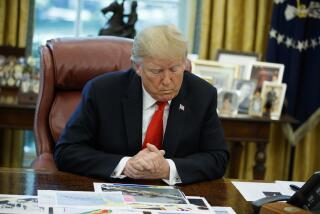Bush Extends His Suspension of New Government Regulations
WASHINGTON — President Bush moved with vigor Wednesday to establish himself as an enemy of big government, extending by 120 days a controversial moratorium on new federal regulations.
Bush said the extension would give his advisers more time to revise pending regulations and eliminate what they see as burdensome requirements for businesses and private citizens. This winnowing-out process will spur the economy and ultimately save American consumers at least $10 billion a year, he said.
But as Bush spoke of taking a “wrecking ball” to rigid government rule-making, senior officials inside the White House hinted at another motivation when they referred reporters to new polls showing public distaste for such regulation.
The extension won praise from business leaders invited by the White House to the announcement at a Rose Garden ceremony.
But it also brought new warnings from critics and prompted a leading environmentalist aligned with the Administration to deride the extension as “a wholesale handout to the American business community.”
For its part, the White House seemed less concerned by such attacks than by the political need to overcome the impression that Bush is part of the big-government problem. For three years his Administration took steps that added enormously to regulatory burdens, but on Wednesday the President promised a red-tape revolution.
“There will be no--I repeat, no--return to business as usual,” he said.
Bush and senior White House officials described the first three months of the moratorium, which began Jan. 28, as an unmitigated success. Bush said that efforts to ease the burden of federal regulations would save the average family at least $225 a year.
The rules affected by the ban are issued by the federal bureaucracy to carry out laws passed by Congress, such as cleaning up the environment, protecting consumers, regulating financial markets and making workplaces safe.
Industry pays a “tax in disguise” when it spends billions of dollars a year to abide by those regulations, Bush said. He stressed that he does not favor ending all regulations but offered an example of how softening some safety regulations could actually improve safety conditions.
But watchdog groups including Public Citizen, an organization affiliated with Ralph Nader, argued that any benefits of the moratorium could not outweigh the human costs of delays and of softening of important health and safety guidelines.
Fred Krupp, executive director of the Environmental Defense Fund and an important adviser to the Administration in drafting the Clean Air Act, emerged from the White House with complaints that the extension could do harm.
Continuing the freeze will weaken enforcement of antipollution laws and prevent endangered species from receiving adequate protection, Krupp said.
“What this represents,” Krupp said, “is really a wholesale handout to the American business community instead of an effort to make sure that the regulations protect the environment and stimulate economic growth and new businesses.”
The bitter comments just outside the door of the West Wing left senior White House officials visibly riled. At a briefing for reporters, Michael J. Boskin, chairman of the White House Council of Economic Advisers, dismissed the criticism as the voice of those who favor a “command and control economy.”
Bush advisers said privately that the dynamics of this election year make environmentalists less important.
“The guy we’re running against doesn’t have much to brag about,” one Bush aide said in referring to Gov. Bill Clinton of Arkansas, the presumptive Democratic presidential nominee.
One of those, the Bush advisers noted, is the need to appeal to a disgruntled electorate and appease its demands for change. Only minutes into the briefing, Boskin and White House counsel C. Boyden Gray showed the results of a poll taken last month by Penn & Schoen Associates, which found that more than 80% of Americans believe that the government has too many unnecessary regulations.
More to Read
Get the L.A. Times Politics newsletter
Deeply reported insights into legislation, politics and policy from Sacramento, Washington and beyond. In your inbox three times per week.
You may occasionally receive promotional content from the Los Angeles Times.










